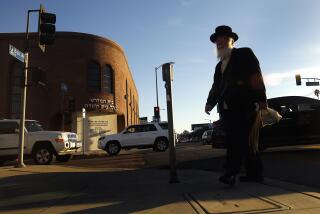Culture Lessons : Holidays: Lectures help Jewish emigres from the former Soviet Union discover the High Holy Day traditions long denied to them in their homeland.
Five-year-old Tzvi Adelerstein raised the shofar to his lips and gave a breathy blast, the sound from the ceremonial ramâs horn spluttering out weakly.
Tzviâs father, Rabbi Yitchok Adelerstein, smiled and picked up a second shofar, successfully emitting a long, loud blow that prompted smiles of approval from the Russian immigrants gathered at the Jewish Learning Exchange in Hollywood.
Speaking in short sentences in deference to the Russian translator, Adelerstein explained the Jewish tradition of sounding the shofar on High Holy Days--a rite few of the 20-plus immigrants in the audience had ever heard about while living in the former Soviet Union, which did not tolerate religion.
Adelersteinâs recent talk on the traditions of Rosh Hashanah, the Jewish New Year, which begins at sundown on Monday, and Yom Kippur, the Day of Atonement, which is 10 days later, was for some of the immigrants the first opportunity they had to learn about 3,000 years of Jewish heritage.
Sponsored by the Jewish Federation Council of Greater Los Angeles and run through its Committee on Refugee Acculturation: Religious Life, the lectures are part of a program to bring Russian-speaking Jewish families in Los Angeles closer to Judaism.
The committee estimates that 50,000 to 60,000 Jews from the former Soviet Union are living in the Los Angeles area.
Although most of them managed to surreptitiously get some knowledge of the Jewish holidays in their homeland, many come to the lectures to fill gaps in their understanding of religious practices, said Alla Feldman, a Russian translator and coordinator for the Council on Jewish Life, a branch of the Jewish Federation Council.
âTo many (Russian) Jews, Judaism was a negative that was imposed upon them,â said Adelerstein, a professor of Judaic Studies at Yeshiva of Los Angeles. âThey suffered because they were Jewish. They never knew why they should be proud that they were Jewish. Now they can taste the fullness and richness of Judaism.â
As Adelerstein outlines the significance of eating sweet food such as honey on Rosh Hashanah to symbolize the sweetness of the new year, his audience nods and smiles, jotting down the howâs and whyâs of the High Holy Days.
Bronislav Bortnik, 17, who arrived from Odessa, Ukraine, two months ago, was attending his second lecture at the center. When asked what he enjoyed learning about, he replied through a translator: âEverything, everything!â
Taking notes as Adelerstein spoke was Alla Smorodinsky, a former Muscovite who came to Los Angeles five years ago with her husband and two children.
She had learned about Passover from her grandparents while growing up in the Soviet Union, but other religious traditions had not been passed along in her family.
At first, it was too dangerous because of the political situation, Smorodinsky said, but later, with the social and political reforms known as perestroika, some of the Jewish youth began to learn about the basic traditions.
Now that she is in Los Angeles, she said, it has become important for her to explore her religion.
âItâs important to know who you are,â she said.
Before she immigrated to Los Angeles in December, 1992, Irena Govlich said she knew little about religious ceremonies and had not celebrated the Jewish holidays in her home in Donetske, Ukraine.
âTo be a religious Jew in Russia was unusual,â she said, adding that there were few synagogues in the former Soviet Union. There had been a synagogue in Donetske, but in the 1930s it was closed and converted to a warehouse, Govlich said.
âOnly in the last year when everything was changing was there an interest in Jewish cultureâ in the Ukraine, she said.
Since coming to Los Angeles, Govlich and her daughter have been active in the Jewish community. But they have not yet joined a synagogue, citing a concern that Jewish Federation officials say many refugees share: lack of money. Many synagogues charge several hundred dollars to join, although some waive the fees for emigres.
âWe have barely enough for everyday necessities,â Govlich said.
Feldman, herself an emigre from the former Soviet Union, said that despite financial constraints, she has watched her compatriots come to discover that religion is something they need.
Earning money, buying food and raising children is not enough, and although it is not easy to do, it is important to seek out a âreligious niche,â Feldman said.
A sense of community is also something most of the emigres who attend his lectures are looking for, said Temple Israel Rabbi Edwin Goldberg, who recently taught emigres the basic prayers and beliefs of Rosh Hashanah and Yom Kippur.
âMostly, theyâre not interested in ritual, but in coming together and being with people who are similar to themselves,â he said.
More to Read
Sign up for Essential California
The most important California stories and recommendations in your inbox every morning.
You may occasionally receive promotional content from the Los Angeles Times.










